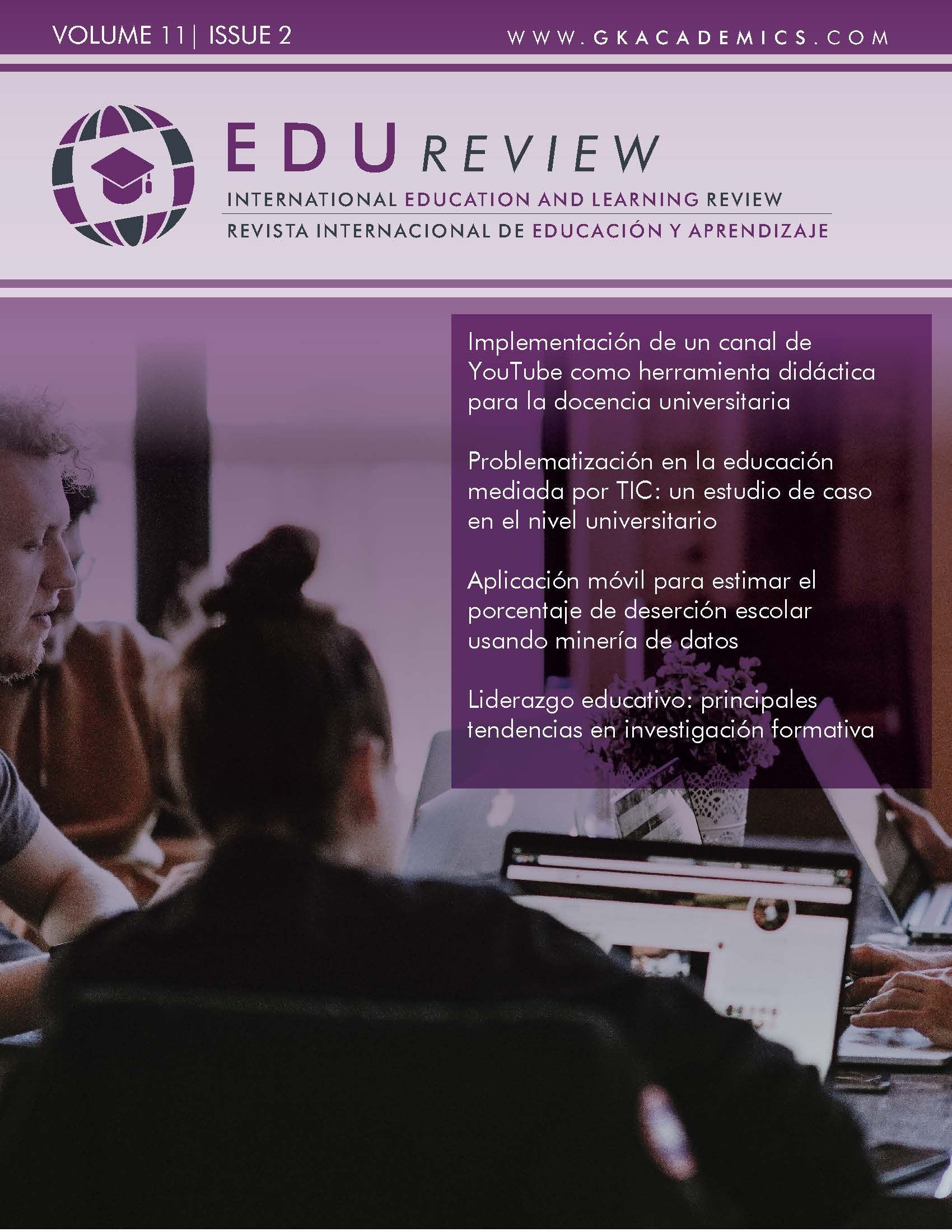Problematization in ICT-Mediated Education
A Case Study at the University Level
DOI:
https://doi.org/10.37467/revedu.v11.5000Keywords:
Problematization, Education, ICT, UseAbstract
It is unquestionable that during the crisis caused by COVID-19, information and communication technologies became the pillar that prevented the collapse of educational systems; However, there are many studies that speak of the problems faced by educational institutions to carry out the teaching-learning processes, highlighting the lack of teacher training in the use of technologies and the lack of clear institutional proposals on how you carry out school activities; In this sense, in the present work a case study is shown on problematization in ICT-mediated education.
Downloads
Global Statistics ℹ️
|
730
Views
|
158
Downloads
|
|
888
Total
|
|
References
Ambuludí-Marín, J. L., & Cabrera-Berrezueta, L. B. (2021). TIC y educación en tiempos de pandemia: Retos y aprendizajes desde una perspectiva docente. EPISTEME KOINONIA, 4(8), 185-203. http://portal.amelica.org/ameli/journal/258/2582582012/html/ DOI: https://doi.org/10.35381/e.k.v4i8.1352
Ávila, P., Peñaloza, B., & Guzmán, A. (2022). Aprendizaje invisible y tecnologías. Realidades y voces de los docentes de educación básica en la pandemia COVID-19. Technological Innovations Journal, 1(2), 7–20. https://doi.org/10.35622/j.ti.2022.02.001 DOI: https://doi.org/10.35622/j.ti.2022.02.001
Castro, J. A., Vargas, A. L., & Alarcón, J. B. (2021). Alfabetización digital y tic en la educación secundaria en Chile: Diagnóstico en tiempos de pandemia. Interciencia, 46(4), 148-155. https://doi.org/10.56918/es.2022.i34.pp11-33
Chan, Chi Gladis Ivette. (2022). Retos y dificultades de docente de nivel secundaria en tiemmpos de Covid-19. Revista de Investigación en Tecnologías de la Información, 10(20). https://doi.org/10.36825/RITI.10.20.009 DOI: https://doi.org/10.36825/RITI.10.20.009
Centro Nacional de Evaluación para la Educación Superior (CENEVAL) (2023). https://ceneval.edu.mx/sobre_el_ceneval-perfil_institucional/
CEPAL-UNESCO (2020). Informe COVID-19- La educación en tiempos de la pandemia de COVID-19. Naciones Unidas. https://repositorio.cepal.org/bitstream/handle/11362/45904/1/S2000510_es.pdf
Coll C., Mauri T. y Onrubia J. (2011). La utilización de las tecnologías de la información y la comunicación: Del diseño tecno-pedagógico a las prácticas en uso. En C. Coll y C. Monereo (Coord). Psicología de la Educación Virtual. (p. 99). Morata, (2ª Ed.)
College Board (2023). https://about.collegeboard.org/
Rosabal, E. M. D., Vidal, J. M. D., Martínez, Y. S., Vázquez, A. E. G., Rodríguez, G. R., & Silva, N. T. (2023). Plataforma Moodle y la aplicación WhatsApp, recursos didácticos en tiempos de COVID-19. Revista de Investigación en Tecnologías de la Información, 11(23), 1-14. https://doi.org/10.36825/RITI.11.23.001 DOI: https://doi.org/10.36825/RITI.11.23.001
Edel-Navarro, R. (2010). Entornos virtuales de aprendizaje: la contribución de" lo virtual" en la educación. Revista mexicana de investigación educativa, 15(44), 7-15. https://www.scielo.org.mx/pdf/rmie/v15n44/v15n44a2.pdf
Examen General de Egreso de Licenciatura (EGEL) (2023). https://ceneval.edu.mx/examenes-egreso-egel/
Hernández, R., Fernández, C., Baptista, M. (2010). Metodología de la Investigación. Mc Graw Hill.
IIEG (2019). Norte. Diagnóstico de la Región. Marzo 2019. Instituto de Información Estadística y Geográfica de Jalisco. México. https://iieg.gob.mx/contenido/Municipios/01_norte_diagnostico.pdf
Martínez, M. (2021). El trabajo docente mediado por TIC, frente a las políticas dictadas por el COVID-19 en el CUNorte. Revista Iberoamericana de Ciencias, 8(2), 30-41. http://www.reibci.org/publicados/2021/ago/4300106.pdf
Márquez, A. M. (2021). Realidades y retos en el uso de las TIC en educación, por la emergencia sanitaria provocada por el COVID-19. Revista de Investigación en Tecnologías de la Información: RITI, 9(19), 73-88. doi: https://doi.org/10.36825/RITI.09.19.006 DOI: https://doi.org/10.36825/RITI.09.19.006
ONU. (2020). Informe de políticas: La educación durante la COVID-19 y después de ella. Naciones Unidas. https://www.un.org/sites/un2.un.org/files/2020/09/policy_brief_-_education_during_covid-19_and_beyond_spanish.pdf
Prueba de Aptitud Académica (PAA) (2023). https://latam.collegeboard.org/paa/que-es-la-paa/
Rodríguez, G., Gil, J., García, E. (1999). Metodología de la investigación cualitativa. Aljibe.
Gómez S. M. (2021). La realidad de la educación rural en tiempo de pandemia. Revista Rastros y rostros del saber, 6(10), pp. 46 – 56 https://revistas.uptc.edu.co/index.php/rastrosyrostros/article/view/14601
Sánchez Puentes, R. (1993). Didáctica de la problematización en el campo científico de la educación. https://www.redalyc.org/pdf/132/13206108.pdf
Santiago Mijangos, A. D., Jiménez Zúñiga, E. A., Pérez Fonseca, M., & Guevara Valtier, M. C. (2021). Uso de las TIC en docentes de una universidad pública del sur de Veracruz. Dilemas contemporáneos: educación, política y valores, 9(SPE1). https://www.scielo.org.mx/pdf/dilemas/v9nspe1/2007-7890-dilemas-9-spe1-00026.pdf DOI: https://doi.org/10.46377/dilemas.v9i.2932
Sierra, M. L., & Gómez, J. A. V. (2021). La pandemia y los retos para la educación. Revista Academia y Virtualidad, 14(1), 9-11. https://doi.org/10.18359/ravi.5784 DOI: https://doi.org/10.18359/ravi.5784
UNESCO. (1998). Conferencia Mundial sobre la Educación Superior. La Educación Superior en el Siglo XXI. UNESCO.
Universidad de Guadalajara. (2022). Anexo estadístico 2021. Universidad de Guadalajara. https://cgpe.udg.mx/sites/default/files/adjuntos/Anexo_2020-2021%2008nov.pdf
Downloads
Published
How to Cite
Issue
Section
License
Those authors who publish in this journal accept the following terms:
-
Authors retain copyright.
-
Authors transfer to the journal the right of first publication. The journal also owns the publishing rights.
-
All published contents are governed by an Attribution-NoDerivatives 4.0 International License.
Access the informative version and legal text of the license. By virtue of this, third parties are allowed to use what is published as long as they mention the authorship of the work and the first publication in this journal. If you transform the material, you may not distribute the modified work. -
Authors may make other independent and additional contractual arrangements for non-exclusive distribution of the version of the article published in this journal (e.g., inclusion in an institutional repository or publication in a book) as long as they clearly indicate that the work was first published in this journal.
- Authors are allowed and recommended to publish their work on the Internet (for example on institutional and personal websites), following the publication of, and referencing the journal, as this could lead to constructive exchanges and a more extensive and quick circulation of published works (see The Effect of Open Access).













